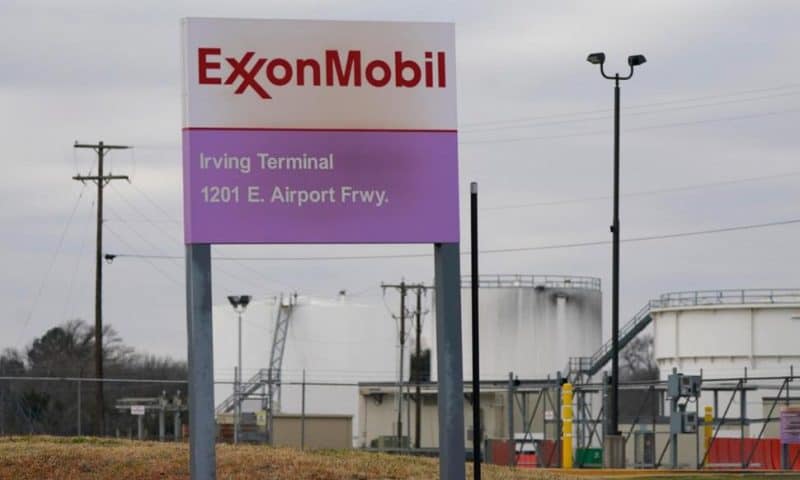Exxon Mobil’s fourth-quarter revenue and profits declined as the oil giant was weighed down by a hefty impairment charge tied to regulatory issues in California
Exxon Mobil’s fourth-quarter revenue and profits declined along with the price of oil, and the energy giant was weighed down by a hefty impairment charge tied to regulatory issues in California. Still, it posted a healthy adjusted profit and the company raised its quarterly dividend.
Shares rose 2% before the market opened Friday.
Revenue for the three months ended Dec. 31 declined to $84.34 billion from $95.43 billion. That fell short of the $91.81 billion that analysts polled by Zacks Investment Research expected.
Exxon earned $7.63 billion, or $1.91 per share, for the quarter. A year earlier, it earned $12.75 billion, or $2.25 per share.
The current quarter included a $2.3 billion impairment charge of which $2 billion related to regulatory obstacles in California that have prevented production and distribution assets from coming back online.
Excluding the charge and other items, earnings were $2.48 per share.
Analysts were calling for earnings of $2.21 per share. Exxon does not adjust its reported results based on one-time events such as asset sales.
The Spring, Texas-based company boosted its quarterly dividend 4% to 95 cents per share.
Exxon went on a bit of a shopping spree last year with oil prices surging.
In July, the company said it would pay $4.9 billion for Denbury Resources, an oil and gas producer that has entered the business of capturing and storing carbon and stands to benefit from changes in U.S. climate policy.
In October Exxon topped that deal by announcing that it would buy shale operator Pioneer Natural Resources for $60 billion. Two months later, the Federal Trade Commission, which enforces federal antitrust law, asked for additional information from the companies about the proposed deal. The request is a step the agency takes when reviewing whether a merger could be anticompetitive under U.S. law. Pioneer disclosed the request in a filing Tuesday.
Elevated levels of cash for all big producers drove a massive consolidation in the energy sector. In October Chevron said it would buy Hess Corp. for $53 billion.
Chevron also reported its financial results Friday, posting a fourth-quarter adjusted profit of $3.45 per share on revenue of $47.18 billion. Wall Street was calling for a profit of $3.29 per share on revenue of $52.59 billion. Its stock climbed slightly in premarket.
The San Ramon, California-based company said both U.S. and worldwide annual production hit a record. Chevron’s board approved an increase in the quarterly dividend to $1.63 per share, up 8%.
On Thursday, Shell plc reported an adjusted profit of $2.22 for the fourth quarter, with revenue totaling $80.13 billion. Analysts predicted a profit of $1.94 per share. Shell’s stock edged slightly higher before the market open.
Oil markets are being stretched by cutbacks in oil production from Saudi Arabia and Russia, and the war between Israel and Hamas still potentially runs the risk of igniting a broader conflict in the Middle East. While attacks on Israel do not disrupt global oil supply, according to an analysis by the U.S Energy Information Administration, “they raise the potential for oil supply disruptions and higher oil prices.”

